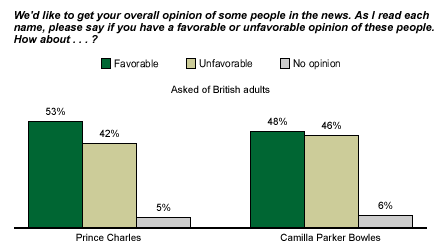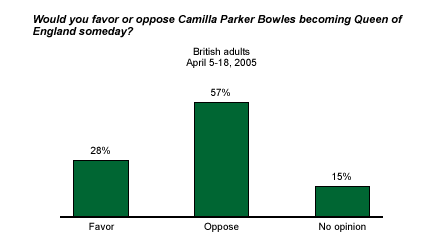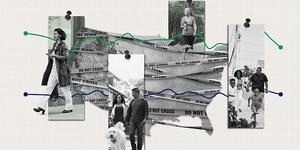On April 9, Charles, Prince of Wales and heir to the British throne, married longtime love Camilla Parker Bowles. Although the pope's funeral and the announcement of the British general election diverted national and worldwide attention from the nuptials, the marriage raises some major constitutional and religious questions, not least because Camilla is a divorcee. What do the British people think about Charles and Camilla, and what have they thought about controversial royal marriages in the past?
Gallup polled Britons' attitudes about the couple April 5-18*. The Prince of Wales garners more favorable (53%) than unfavorable (42%) opinion in Britain. But his new wife extracts more contrasting attitudes. Britons are almost evenly divided on Camilla -- 48% say they have a favorable opinion of the Duchess of Cornwall, while 46% have an unfavorable opinion.

The youngest Britons (those aged 18 to 29) and older Britons (those 50 and older) are somewhat more likely than Britons aged 30 to 49 to view Camilla unfavorably.
A History of Royal Controversies
Debate over royal marriages in Great Britain is nothing new. In 1936, King Edward VIII, who had not yet been crowned, abdicated the throne so he could marry an American divorcee, Wallis Simpson. Gallup did not ask Britons directly at that time if they thought Simpson should be allowed to become queen, but a Gallup Poll conducted several months later showed a large number of Britons, 39%, did not even think Edward and his new wife should be invited to return to live in England (the couple lived the rest of their lives abroad).
Nearly 20 years later in 1955, a new controversy arose over the intention of the queen's sister, Princess Margaret, to marry the divorced Group Captain Peter Townsend. British public opinion on royal marriage had become more accommodating by that time -- 63% of Britons said Townsend's divorced-status didn't matter, but a fifth (19%) said it was a reason why she should not marry him. Interestingly, when respondents who opposed the marriage were asked why, they gave reasons in addition to Townsend's divorce, such as his age or social status. Regardless, Princess Margaret ultimately set her own wishes aside and never married Townsend.
Queen Camilla?
Unlike Edward, Charles has not renounced his right to the throne, and unlike Margaret, Charles has gone ahead with his marriage to Camilla despite the criticism. So now the big question is: Will Camilla ultimately become queen? If the British people have any say in it, the answer would be no; just 28% favor Camilla becoming queen someday and 57% oppose it.

When Charles and Camilla's engagement was first announced, it was also announced that Camilla will not be called queen if Charles becomes king. But just because she won't be called queen doesn't mean she won't become queen. British law as it currently stands calls for the king's wife to be queen, so if Camilla is to be prevented from becoming queen, parliament will need to change the law. With the current queen alive and in good health, there is no urgent reason to do so. We will have to wait to see how public opinion might change in the future when this issue finally has to be confronted.
Camilla has tried to keep a low profile in the media. With her marriage to Charles, she will be able to make frequent public appearances and be interviewed. The British public will become more familiar with Camilla personally, and opinions could change. At the very least, if opinion toward Camilla becomes less adverse, politicians may see no need to spend legislative time on the succession -- and Camilla may become queen without being called one.
Monarchy in a Democracy
Monarchy has survived in the age of democracy in Britain because the royal family has served the interests of politicians. In Edward's case, when he ceased serving the country's political interests, he ceased serving as monarch.
Charles has apparently followed public opinion by saying that his wife will not be called queen when he ascends the throne. He may also have waited until public opinion would accept the marriage before marrying Camilla. Only time will tell whether the same type of waiting will eventually allow Camilla to be queen in more than technicality only.
*Results in Great Britain are based on telephone interviews with 1,012 national adults, aged 18 and older, conducted April 5-18, 2005. For results based on the total sample of national adults, one can say with 95% confidence that the maximum margin of sampling error is ±3 percentage points. The survey was conducted by Gallup UK.